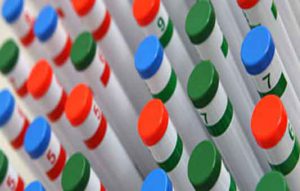 Researchers at the University of British Columbia have identified a new, more powerful group of enzymes from the human gut, that can turn any type of blood into the universally usable type O as much as 30 times more efficiently than previously studied enzymes, expanding the pool of potential blood donors and making blood matching safer and easier.
Researchers at the University of British Columbia have identified a new, more powerful group of enzymes from the human gut, that can turn any type of blood into the universally usable type O as much as 30 times more efficiently than previously studied enzymes, expanding the pool of potential blood donors and making blood matching safer and easier.
“Blood type is determined by the presence of antigens on the surface of red blood cells; type A blood has the A antigen, B has the B antigen, AB blood has both antigens and O blood has none,” said lead researcher Stephen Withers, a professor of chemistry at UBC.
“We have been particularly interested in enzymes that allow us to remove the A or B antigens from red blood cells,” Stephen Withers, Ph.D., says.
“If you can remove those antigens, which are just simple sugars, then you can convert A or B to O blood.”
He says scientists have pursued the idea of adjusting donated blood to a common type for a while, but they have yet to find efficient, selective enzymes that are also safe and economical.
“Antigens can trigger an immune response if they are foreign to the body, so transfusion patients should receive either their own blood type, or type O to avoid a reaction.
That’s why O blood is so important.”
Removing antigens from blood effectively transforms it into type O.
Withers and his team previously developed enzymes that were capable of doing so, but this latest study identifies a more powerful group of enzymes found in the human gut.
To assess potential enzyme candidates more quickly, Withers collaborated with a colleague at his institution, the University of British Columbia (UBC), who uses metagenomics to study ecology.
“With metagenomics, you take all of the organisms from an environment and extract the sum total DNA of those organisms all mixed up together,” Withers explains.
Casting such a wide net allows Withers’ team to sample the genes of millions of microorganisms without the need for individual cultures.
The researchers then use E. coli to select for DNA containing genes that code for enzymes that can cleave sugar residues.
So instead of using metagenomics as a means of learning about microbial ecology, Withers uses it to discover new biocatalysts.
“This is a way of getting that genetic information out of the environment and into the laboratory setting and then screening for the activity we are interested in,” he says.
Withers’ team considered sampling DNA from mosquitoes and leeches, the types of organisms that degrade blood, but ultimately found successful candidate enzymes in the human gut microbiome.
Glycosylated proteins called mucins line the gut wall, providing sugars that serve as attachment points for gut bacteria while also feeding them as they assist in digestion.
Some of the mucin sugars are similar in structure to the antigens on A- and B-type blood.
The researchers homed in on the enzymes the bacteria use to pluck the sugars off mucin and found a new family of enzymes that are 30 times more effective at removing red blood cell antigens than previously reported candidates.
“We then produced quantities of those enzymes through cloning and found that they were capable of performing a similar action on blood antigens.”
Withers and his colleagues — UBC microbiologist Steven Hallam and pathologist Jay Kizhakkedathu of the Centre for Blood Research at UBC — are applying for a patent on the new enzymes and are hoping to test them on a larger scale in the future, in preparation for clinical testing.
“Expanding global blood supply is critical in light of growing populations and the frequency of natural disasters,” said Withers, pointing out that both the U.S. Red Cross and Canadian Blood Services have recently made emergency appeals for blood donations.
“Our hope is that one day we can eventually render any type of donated blood, tissues or organs, safe for use by anyone regardless of their native blood type.”
The study, funded by the Canadian Institutes of Health Research, will be presented today at the American Chemical Society’s annual meeting in Boston.
For more information
Gut bacteria provide key to making universal blood
Link…
Transforming all donated blood into a universal type
Link…
The University of British Columbia
Link…
MDN
This post is also available in:
 Italian
Italian


